Greek operation
Grouping of German troops (six divisions, including one tank, combined in the 18th and 30th corps) had great superiority in manpower and equipment over the army of “East Macedonia”. However, relying on the line of fortifications and the mountainous terrain favorable for defense, the Greek forces offered stubborn resistance to the enemy for three days. Here was located the so-called. Metaxas line - a system of Greek defensive fortifications, on the border with Bulgaria, from Mount Beles to the region of Komotini.
The defensive line was built in 1936 — 1940. The total length of the line, including the unfortified areas where it was interrupted, was about 300 km. The line was named for the Prime Minister and Minister of Defense, General Ioannis Metaxas. The line consisted of an 21 fortified complex (fort) capable of defending from all directions, which included dugouts and casemates, artillery machine guns and mortar bunkers, observation posts, numerous entrances and exits. The underground facilities of each fort included a command post, officers ’halls, private rooms, a telephone center, a kitchen, water tanks, lavatories, food warehouses, a medical center with an operating room, a pharmacy, a ventilation system, a lighting system (generators, kerosene lamps, lights and others), sewers, external combat positions, anti-tank obstacles, positions of anti-aircraft guns, etc. The line also included networks of anti-tank ditches, zones of reinforced concrete anti-tank rams.
The German 18th and 30th Army Corps attacked the line from April 6 and after only three days of battles had only local success. For 4 days, despite massive shelling and the use of assault aviation and the assault groups that used dynamite, launched gases and gasoline inside, the Germans could not take the dominant positions of the Greek defense line.
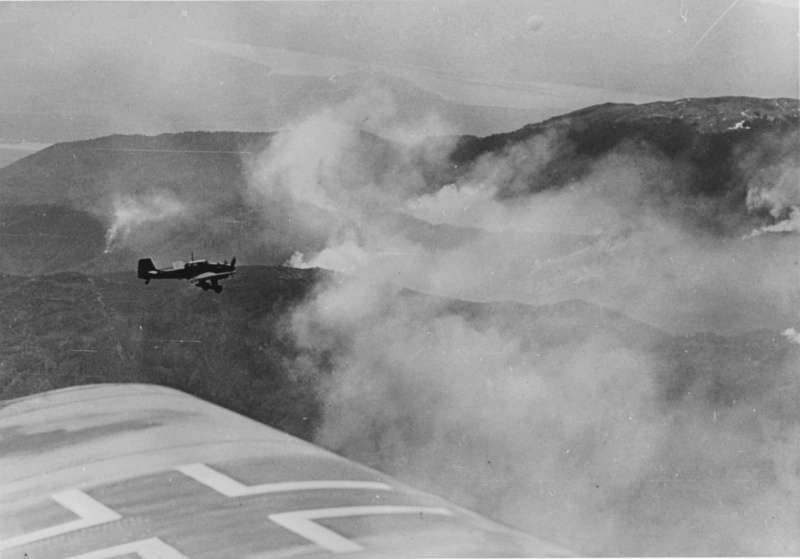
German Junkers U-87 dive bomber in flight in the area of the Greek Metaxas defensive line
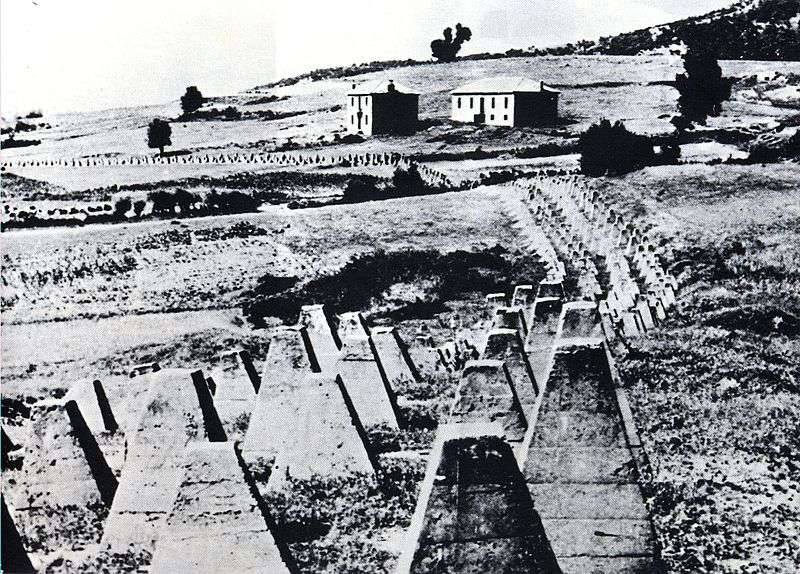
Anti-tank facilities line Metaxas
However, at this time, the Wehrmacht’s 2 Panzer Division (18 Corps), advancing through Yugoslav Macedonia along the Strumitsa Valley, bypassing the Doyranskoye Lake, made a detour, crossed the Bulgarian-Yugoslav border on April 8, and without meeting serious resistance, the virtually uncovered Greco-Yugoslav border and the valley of the Axios River reached Thessaloniki on April 9. Thus, already on April 9, the Germans took Thessaloniki, went to the rear of the army "Eastern Macedonia", cut it off from other Greek armies.
On the same day, the Greek General Staff, believing that the struggle in Eastern Macedonia does not make any more sense, provided the opportunity for General K. Bakopulos, the commander of the army of "Eastern Macedonia" to continue to fight or surrender at his discretion. Bacopoulos, the famous Germanophile, did not fail to use the order and gave the order to surrender the forts. The commanders of most of the forts did not obey and continued to resist. However, resistance has already taken the form of battles for the “honor weapons”And, having received the honorable conditions of surrender from the German command, the forts stopped the battle one by one, starting on April 10. For its part, the German command offered the most honorable conditions for surrender, in order to complete the work faster and not force the Greeks to fight to the end. Field Marshal Wilhelm List, said that the Greek army could leave the forts, keeping its military flags with them, but subject to the surrender of weapons and ammunition. He also ordered his soldiers and officers to pay tribute to Greek soldiers.
The rapid advance of the German divisions in Yugoslavia put the Greater-British Army “Central Macedonia” in an extremely difficult position. By entering the Bitola area, the German forces threatened to bypass its positions from the rear and isolate it from the Greek forces that fought in Albania. On April 11, the high command of Greece decided to divert forces from Albania to a new line of defense - from Mount Olympus in the east to Lake Butrint in the west. The departure of the Greek troops from Albania began on April 12.
In the area of Florin, between 10 and 12 of April, very heavy battles were fought against the two Greek divisions defending here and the English tank regiment. In these fierce battles the Greeks repeatedly went over to counterattacks. On April 12, German formations, with the effective support of aviation, broke through enemy defenses in many places and, pursuing the British, began to move swiftly to the southeast. At the same time, they expanded the breakthrough in the southern and south-western directions. Thus, the German troops, advancing from the Bitola area through Florina and further south, again created the threat of engaging the Anglo-Greek forces and during 11 - 13 on April forced them to hastily retreat to the city of Kozani. As a result, the German troops went to the rear of the army "Western Macedonia", isolating it from the troops located in the central part of the country.
The British command, believing that further resistance was meaningless, decided to evacuate its expeditionary force from Greece. General Wilson was convinced that the Greek army had lost its combat capability, and its command had lost control. After the meeting of Wilson with General Papagos on April 13, it was decided to retreat to Thermopylae, Delphi and, thus, to leave the enemy the entire northern part of the country. British troops from April 14 retreated to the coast for evacuation.
13 April, Hitler signed directive No. 27, in which he clarified the plan of action of the German troops in Greece. The German command called for two strikes at converging directions from the areas of Florina and Thessaloniki on Larisa in order to surround the Anglo-Greek troops and thwart attempts to form a new front of defense. In the future, by advancing the motorized units, it was planned to seize Athens and the remaining territory of Greece, including the Peloponnese. Particular attention was paid to prevent the evacuation of British troops by sea.
However, the coverage of the Greek-English group, located east of Florina, failed. The British still 10 April began to move away from positions in the lower Vistrita River and by April 12 under the guise of the Greek rear guards operating between Vistritsa and Vermion Mountains, took new positions that stretched from Mount Olympus to the Chromion district in the Vistrita bend. At that time, units of the 12 Army, advancing from Thessaloniki, were still fighting with the Greek rearguards. For five days, British troops retreated to 150 km and by April 20 concentrated in the Thermopylae area. The main forces of the Greek army remained in the north-west of the country, in the mountains of Pinda and Epirus. The remnants of the army "Central Macedonia" and the army of the army "Western Macedonia", which suffered great losses, were reassigned to the commander of the army "Epirus". This army retreated, leading restraining battles with Italian troops and being subjected to fierce air strikes. With the release of the Germans in Thessaly, the Epirus army had practically no opportunities for retreat to the Peloponnese.
The defeat at the front and the order of the Greek government to withdraw troops from Albania caused a long-standing crisis in the military-political leadership of Greece. The generals of the Epirus Army, which had long been a center of Germanophilism, demanded an end to the hostilities with Germany and a truce with it. They put forward only one condition - to prevent the occupation of Greek territory by Italy. The Greeks did not want to capitulate to Italy, which they had previously beaten.
On April 18, a military council was held at Tati near Athens, at which General Papagos reported that from a military point of view, the position of Greece is hopeless. The meeting of the Council of Ministers held on the same day revealed that some of its participants support the displaced generals of the Epirus army, while others stand for the continuation of the war, even if the government has to leave the country. Confusion arose in the ruling circles of Greece. It intensified even more when Prime Minister Korisis committed suicide in the evening of April 18. However, at this time supporters of the continuation of the war gained the upper hand. The new Prime Minister Zuderos and General Papagos demanded that the command of the Epirus army continue to resist. But the newly appointed compound commanders refused to obey, dismissed the army commander Pitzikas and put General Tsolakoglu in his place. He expelled the truce to the German troops and in the evening of April 20 signed with the commander of the SS division "Adolf Hitler" General Dietrich an armistice agreement between Greece and Germany. The next day, Field Marshal Liszt replaced this agreement with a new one - on the surrender of the Greek armed forces, but Hitler did not approve it. Considering Mussolini’s insistent requests, he agreed that Italy should be among the signatories of the surrender agreement of the Greek army. This third agreement was signed by General Zolakoglu 23 on April 1941 in Thessaloniki. On the same day, King George II and the government left Athens and flew to Crete. As a result, the most powerful Greek army - 500-thousand. Army "Epirus" capitulated.
The British command began an emergency evacuation (Operation Demon). On the night of April 25, in small ports of Attica and Peloponnese, heavy loading began to load the ships of the first divisions of the British troops. At this time, other British units were fighting backward battles, trying to restrain the advance of the German troops. An attempt by the Germans to crush the retreating English Expeditionary Corps was not successful (or the Germans didn’t try too hard). Destroying the roads behind them, the British units managed to avoid major battles with the enemy.
The troops had to be evacuated on the open coast, on small fishing grounds, as the port facilities, especially in Piraeus, were heavily destroyed by German aircraft and, moreover, German aircraft were constantly monitoring all ports. There was no significant fighter cover. In Greece, the British were loading in difficult conditions under the absolute domination of German aircraft and were forced to confine themselves to night hours. After all abandoned heavy weapons were destroyed or rendered unusable, parts were transferred by rail or road to assembly points located near the loading sites. Evacuation of troops lasted for five nights. Alexandria squadron allocated for the evacuation of all light forces, including six cruisers and nineteen squadron destroyers. In the first two nights, 17 thousand people were evacuated. Further loading was carried out at the strongest onslaught of the German troops.
On April 25, German troops occupied Thebes, and the next day they captured Corinth with the help of an airborne assault force, cutting off the English retreat to Peloponnese by remaining British troops in Attica. April 27 German troops entered Athens, and by the end of April 29 reached the southern tip of the Peloponnese. By this time, the bulk of the British troops (more than 50 thousand from 62 thousand people), having destroyed heavy weapons and means of transport, was evacuated by sea. The rest of the troops were forced to lay down their arms. During the evacuation, the British lost 20 ships, but these losses were partially offset by the fact that the 11 of the Greek warships came under the control of the British.
After the occupation of Greece, Germany captured numerous Greek islands in the Ionian and Aegean seas. They were of great importance for the struggle with the British.
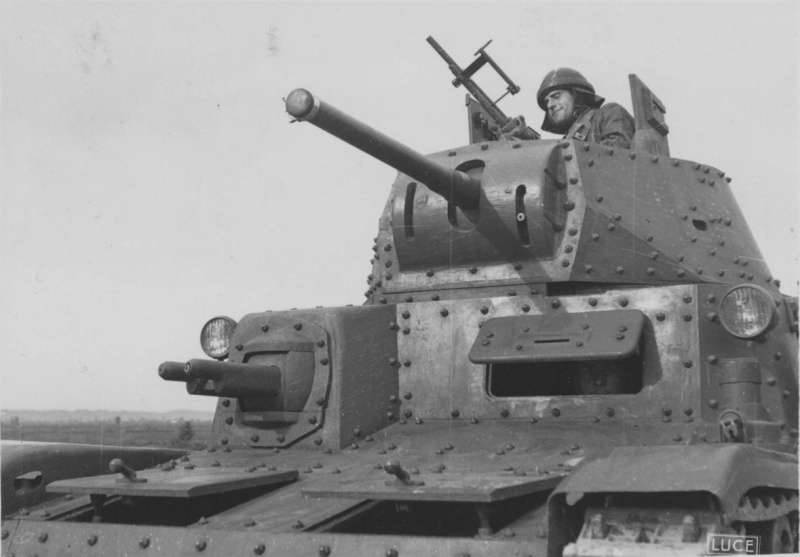
Italian tank M13 / 40 in Greece
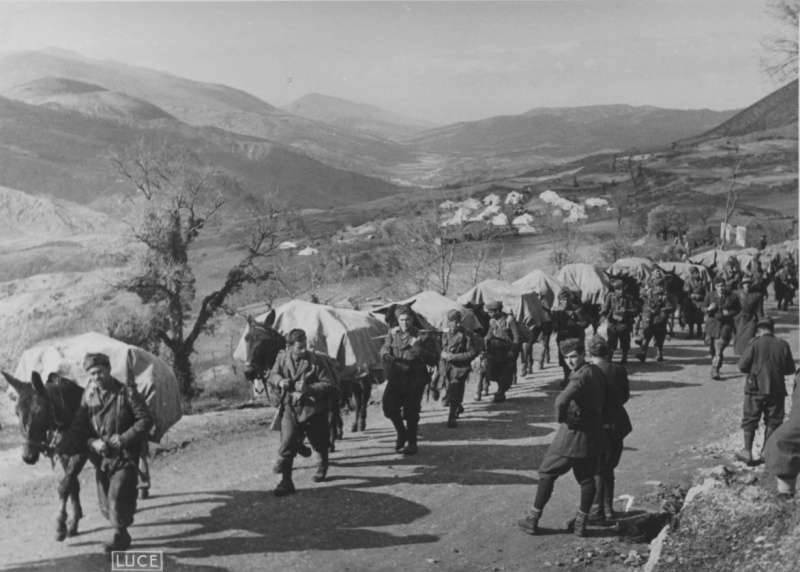
Column of Italian soldiers with pack animals on the road in the mountains of Greece
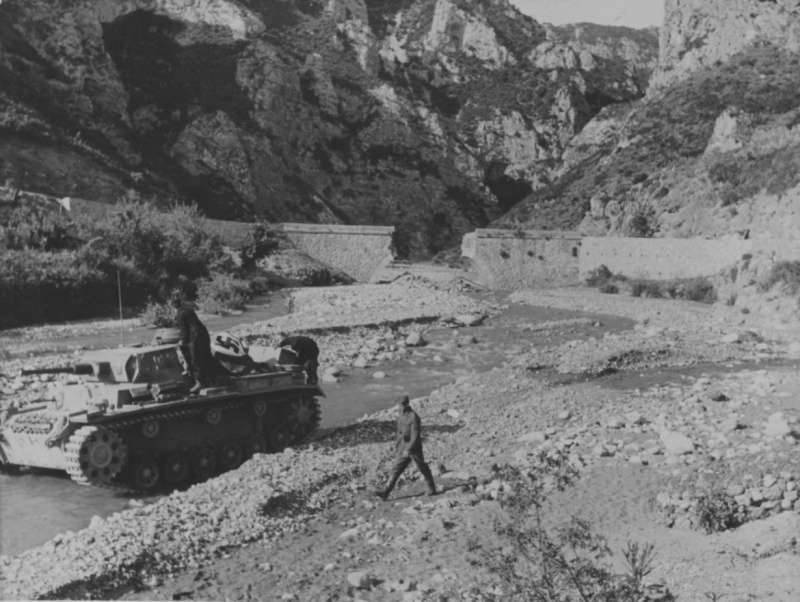
German tank Pz.Kpfw.III on the bank of a mountain river in Greece
Results
In Athens, a government of local traitors was created to obey the Germans and Italians. In the Balkans, a predatory "new order" was established. The task of creating a large strategic base in South-Eastern Europe for an attack on the USSR, which had large economic and human resources, was solved. England lost the fight for the Balkans.
With the completion of the Balkan campaign, the overall strategic situation in Southeastern Europe and the Eastern Mediterranean region has changed significantly in favor of the Reich. The oil-bearing areas of Romania were now inaccessible to British aviation. Germany has at its disposal the entire network of railways, highways, ports and airfields of the region. The economy of the Balkans was put to the service of Germany.
The Balkan campaign, which lasted 24 of the day (from 6 to 29 of April), strengthened the belief of the German military-political leadership in a blitzkrieg - "blitzkrieg". The Germans occupied all of Greece in just three weeks, with the exception of the island of Crete, which they captured with the help of an airborne assault force at the end of May, knocking out the British from there. Germany was able to achieve domination in the Balkans at a very low price - 2,5 thousand killed, about 6 thousand wounded and 3 thousand people missing.
Greece lost 13 people killed 325 people, more than 62 thousand people injured and 1290 missing. British losses - 903 killed, 1250 wounded, about 14 thousand prisoners.
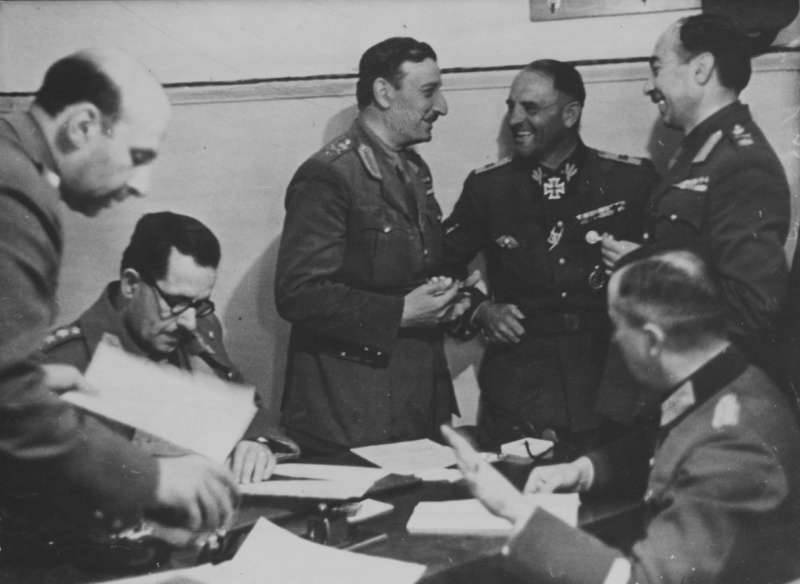
Greek General Georgios Zolakoglu (sitting at the table on the left) and Obergruppenführer SS Sepp Dietrich (standing second from the right) during the signing of the surrender of Greece
Bridgehead further aggression
The defeat of Yugoslavia and Greece meant that Germany occupied a dominant position on the Balkan Peninsula. Thus, in the opinion of the German military-political leadership, favorable conditions were created for an attack on the USSR from the southern strategic direction. The Balkans became the rear base for the war with the Soviet Union.
German Nazis and Italian fascists established their “new order” in the Balkans. Berlin and Rome in domestic politics relied on stirring up national contradictions and cultivating anti-Serb sentiments. That is, they did what Catholic Rome and Muslim Istanbul used to do when they dismembered a single ethno-linguistic South Slavic (Serbian) community into parts hostile to each other. The main role in this process was to be played by the puppet "independent state of Croatia" (NGH), at the head of which the Croatian Ustashi were put.
The seaside part of Croatia was occupied by the Italians. However, 6 June 1941, when the leader of the Ustashi Pavelic visited Germany, Hitler agreed to include Sanjak, Bosnia and Herzegovina in Croatia. After the expansion of the boundaries of NGH had about 40% of the population and territory of the fallen Yugoslavia. During a meeting with Pavelic, Hitler advised him to “pursue a policy of national intolerance for 50 years, thus sanctioning the mass extermination of the Serbian population. 15 June 1941 Croatia joins the Tripartite Pact. Thus, Croatia became a zealous satellite of the Third Reich.
Most of Slovenia became part of the German Empire, a smaller part, the province of Ljubljana - into Italy. Hungary and Bulgaria got their pieces of booty. Italian fascists masked the occupation policy by creating “independent” puppet states. They annexed part of Kosovo and Metohija, part of Macedonia and Northern Greece to Albania, which was under the Italian protectorate, and proclaimed the creation of the “Great Albania”, incorporated into the Italian empire and ruled by the Italian governor. Having occupied Montenegro, the Italians planned to recreate the Montenegrin kingdom, which would be linked by personal union with Italy.
A special place was given to Bulgaria. The Germans deftly used the nationalist frenzy of the Bulgarian elite and the bourgeoisie, which had intensified under the influence of military successes. Sophia, on the one hand, was in a hurry to participate in the creation of a “new order” in the Balkans, on the other hand, she tried to create an impression in the world that the Bulgarians were not directly involved in German-Italian aggression. 15 April 1941 Bulgaria broke off diplomatic relations with Yugoslavia. 19 April, Hitler received the Bulgarian Tsar Boris. During the negotiations, questions were resolved on the Bulgarian territorial claims and the participation of the Bulgarian army in the occupation service in Yugoslavia and Greece. 19 April, the Bulgarian army entered the territory of Yugoslavia, occupied the Pirot district and part of Macedonia. Bulgarian troops also entered northern Greece. By transferring part of the territories of Yugoslavia and Greece under the control of the Bulgarian troops, the German command released troops for the war with the USSR. 24 On April 1941, an agreement was reached between Germany and Bulgaria that guaranteed the Reich the use of the economic resources of the regions transferred to Bulgaria.
Berlin tried to keep its partners and satellites in the Balkans in constant tension and uncertainty, emphasizing the temporary nature of the solution of territorial issues. For example, the final partition of Greece, the solution of the question of the Bulgarian claims to Thessaloniki, Hitler postponed until the end of the war. Formally, the Third Reich agreed that Greece was the sphere of influence of Italy. However, the strategic points - Thessaloniki, Athens, the port of Piraeus, strongholds on Crete and other islands - remained under German control. The Germans formed a puppet Greek government led by Tsolakoglu, who obediently followed the instructions of the Eternal Reich. At the same time, an imperial commissioner was sent to Greece, to whom the real power in the country belonged.
9 June 1941 Field Marshal Liszt was appointed commander in chief of the Wehrmacht in the Balkans. He led the occupation administration and coordinated with the Italian and Bulgarian armies. Thus, Germany was concentrated in the hands of all political, military and economic power in the Balkan Peninsula.
With the end of the Balkan campaign, the German command immediately began to transfer the liberated troops to the borders of the USSR. The tank divisions of the 12 Army were transferred here from Greece. Part of the army headquarters was sent to Poland. By May 1941, preparations for the use of Romanian territory for the strategic deployment of Wehrmacht units were completed.
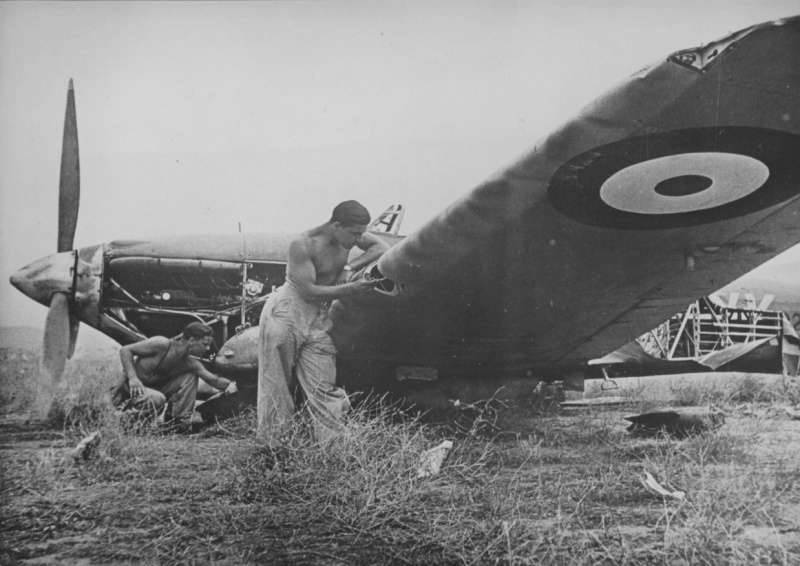
German soldiers are studying British fighter Hurricane captured in damaged condition
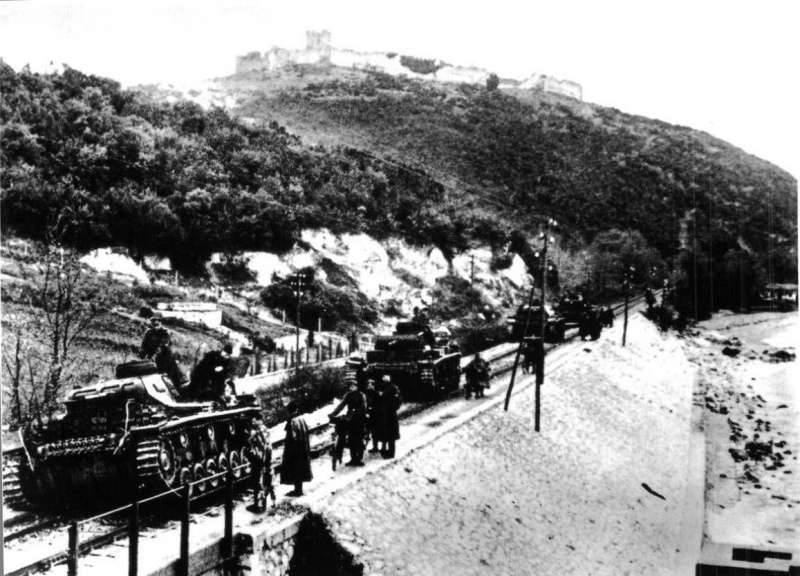
Column of German tanks Pz.Kpfw. III moves through the mountainous region of Greece in April 1941, using railway tracks
Sources:
Halder F. Occupation of Europe. Military diary of the Chief of General Staff. 1939 — 1941. M., 2007.
History World War II 1939 — 1945 (in 12 volumes). Ch. ed. A. A. Grechko. Tom 3. M., Military Publishing, 1974.
Kurt von Tippelskirch. The history of World War II 1939 — 1945. M., SPb., 1999 // http://militera.lib.ru/h/tippelskirch/index.html.
World War. 1939-1945. M., SPb., 2000 // http://militera.lib.ru/h/ww2_german/index.html.
Solovyov B.G. The suddenness of an attack is an instrument of aggression. M., 2002.
V.T. Fomin. Fascist Germany in the Second World War (September 1939 g. –June 1941 g.). M., 1978 // http://militera.lib.ru/research/fomin_vt01/index.html.
http://waralbum.ru/.
Information